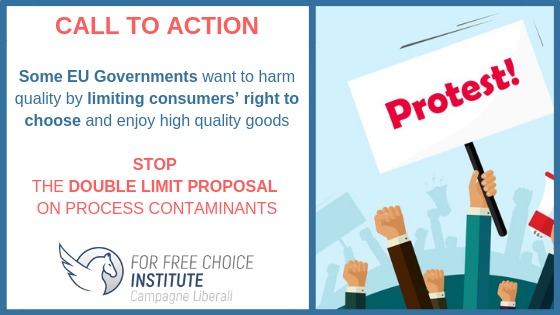
Some EU Members, under the pressure of national lobbies, are trying to introduce limits that would harm consumers. Who is behind this proposal?
Let’s stop EU Governments that want to harm quality by restricting consumers’ right to choose and enjoy high quality goods and by hindering companies’ entrepreneurial attitude towards good food products.
Ask your Government representatives, your MPs, MEPs and any public official to protect your right to access and buy high standard and high quality products.
Under the pressure of rapeseed farmers and producers, Governments such as France, are lobbying the European Commission to introduce double limits for process contaminants 3-MCPD in vegetable oils.
WHY IT MATTERS TO YOU The chemical 3-monochloropropane diol (3-MCPD) and related substances called 3-MCPD esters are food processing contaminants found in some processed foods and vegetable oils. 3-MCPD and its esters are formed unintentionally in these foods, in particular during oil refining processes. There is no risk for humans if the contaminants level is below the limits recommended by the EU Commission. The limits are based on a long and peculiar scientific researchwork and on the political will of countries and stakeholders’ interests.
The latest news from Brussels reports that European farmers’ lobbies and linked Governments want to introduce a double limit on contaminants. Yes, you understood correctly. Europe wants to introduce a ‘first league’ and a ‘second league’ of oils.
- 1.25 ppm (parts per million) for vegetable oils, coconut oil and palm kernel oil
- 2.50 ppm for other oils and mixes of the two groups
In other words, a well-regulated and organized ‘first league’ for the elite and an oversimplified ‘second league’ where minor – according to them – oils could be delimited with softer rules. Why should some vegetable oils be allowed to contain more contaminants than others? Isn’t consumers’ health more important than the interests of French and Swiss lobbies of large producers of rapeseed or even sunflower oil?
This non-sense proposal will sensibly penalize those companies that have betted on quality by investing on sharp and advanced techniques to reduce contaminants and provide the higher quality and the healthiest good to European costumers. A relevant number of them is already furious and extremely worried to be misled if this double limit could be introduced. What is more, quality-checks will be more difficult to perform. In other words, Europe is giving up on quality.
We suggest to introduce a single limit for all oils. In this way companies will be free to continue their investments on quality and safety.
Rapeseed farmers and producers may argue that the double standard favors palm oil producers and users. Don’t let them fool you. This is why we invite you to take action. More tolerance on contaminants would give to consumers’ groups and NGOs a reason to attack palm oil once more. This would push careful food companies to migrate to other ‘healthier’ oils with ‘less contaminants’ just to chase uninformed consumers and appease NGOs – who are mostly funded by Governments, farmers and lobbies. What a circus…
This double-limit system is designed to penalize palm oil and therefore consumers’ right to eat high quality goods.
NGOs, in the paycheck of lobbies of producers of rapeseed and sunflower are ready to resume their campaign to discredit palm oil, accusing it of being ‘rich’ in contaminants. It’s the usual Ponzi scheme that NGOs use to get money from industries. Let’s open our eyes folks!
Take action, call your Government representatives and tell them you want to enjoy good quality products, you want a single limit for process contaminants 3-MCPD in all vegetable oils.
Don’t let Governments and farmers take your freedom away. Stand up.
